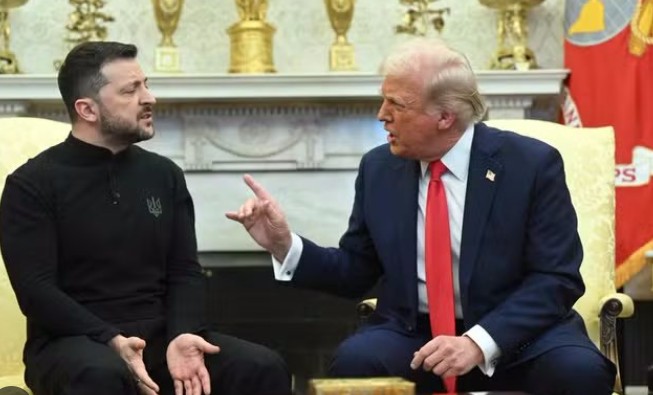U.S. Suspends Intelligence Sharing with Ukraine Amid Tensions Over Conflict Resolution

Washington, D.C. — The U.S. Central Intelligence Agency (CIA) has confirmed the suspension of intelligence sharing with Ukraine, following a directive from President Donald Trump. CIA Director John Ratcliffe announced the decision, which came amid growing tensions surrounding Ukraine’s ongoing conflict with Russia.
This move follows a broader shift in U.S. policy, as reports surfaced earlier in the week that the U.S. had also suspended military aid to Ukraine. The suspension includes both the cancellation of new weapons purchases and the halt of ongoing shipments. These actions have sent shockwaves through Kyiv, which has long relied on U.S. military and intelligence support in its ongoing struggle against Russian-backed separatists and Russian forces in eastern Ukraine.
Ratcliffe explained that the decision to suspend intelligence sharing was made after Trump ordered a pause to assess whether Ukraine was genuinely ready to work toward a peaceful resolution with Russia. The White House has indicated that the suspension is a temporary measure, with U.S. officials wanting to evaluate Ukraine’s willingness to engage in negotiations and show progress in resolving the conflict diplomatically.
Trump’s Stance on Ukraine
President Trump has long been critical of U.S. involvement in foreign conflicts, and his stance on Ukraine has reflected his “America First” policy. Trump’s recent decisions to halt aid and intelligence sharing appear to be part of a broader strategy to push Ukraine to engage more actively in peace talks with Russia.
The suspension of intelligence sharing with Ukraine marks a significant shift in U.S.-Ukraine relations, which have been characterized by strong cooperation since Russia’s annexation of Crimea in 2014. The United States has provided Ukraine with significant military and intelligence support over the years, including anti-tank missiles, radar systems, and intelligence to help combat Russian aggression.
However, as tensions between Washington and Kyiv have escalated, especially over the effectiveness of the Ukrainian government’s military strategies, Trump has questioned the value of continued U.S. support. The President has repeatedly signaled that Ukraine needs to show more initiative in seeking a diplomatic solution, rather than relying heavily on foreign assistance.
Impact on Ukraine’s Defense Capabilities
The suspension of both military aid and intelligence sharing is expected to have a serious impact on Ukraine’s defense capabilities. Over the years, U.S. intelligence has played a key role in helping Ukrainian forces track Russian movements and anticipate potential threats. The halt of intelligence sharing will likely hinder Ukraine’s ability to respond effectively to Russian maneuvers in the region.
Military experts have warned that without continued access to vital U.S. intelligence, Ukraine could struggle to maintain its defense posture against Russia. Furthermore, the suspension of military aid could delay crucial supplies of weapons and equipment, potentially weakening Ukraine’s strategic position in the ongoing conflict.
U.S. and International Response
The suspension has drawn criticism from some members of the U.S. Congress, as well as from Ukraine’s allies in Europe. Senator Lindsey Graham, a staunch advocate for Ukraine, expressed concern that halting intelligence sharing could embolden Russia and prolong the conflict. “We must stand by Ukraine and ensure they have the resources needed to defend their sovereignty,” Graham said in a statement.
On the international stage, the European Union and NATO have also expressed concern over the situation. Both organizations have called for renewed efforts to find a diplomatic solution to the conflict and to continue supporting Ukraine in its struggle against Russian aggression. However, they have also acknowledged the complexity of the situation and the need for Ukraine to demonstrate a willingness to negotiate.
The Path Forward
As the situation unfolds, it remains unclear how long the suspension of intelligence sharing will last. While U.S. officials have stressed that the measure is not permanent, it sends a strong message to Ukraine: the U.S. expects progress toward a peaceful resolution of the conflict with Russia.
For now, Ukraine finds itself at a critical crossroads. The country’s leadership will need to weigh the pressures from both its Western allies and Russia, and decide whether to take bold steps toward diplomacy or continue relying on military solutions.
In the meantime, the suspension of U.S. intelligence sharing serves as a reminder of the delicate balance of power and diplomacy at play in one of Europe’s most volatile regions. How Ukraine responds to these developments could shape its future relationships with both the U.S. and Russia and ultimately determine the course of the conflict.
